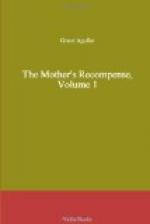Still Caroline spoke not, moved not. Her mother continued, “If you do, why should you hide it from me, your own mother, Caroline? You believe my conduct changed towards you, but you have condemned me without proof. You have abandoned my sympathy—shrunk from my love. Try me now, my sweet child; if you love another, confess it, and we will do what we can to make that love happy; if it be returned, why should you conceal it? and if it be not, Caroline, my child, will you refuse even the poor comfort your mother can bestow?”
She spoke in vain; but could she have read her daughter’s heart at that moment, maternal affection might not have been so deeply pained as it was by this strange silence. Regret, deep, though unavailing, had been Caroline’s portion, from the moment she had reflected soberly on her rejection of St. Eval. She recalled his every word, his looks of respectful yet ardent admiration, and she wept at that infatuation which had bade her act as she had done; and then his look of controlled contempt stung her to the quick. He meant not, perhaps, that his glance should have so clearly denoted that she had sunk in his estimation, it did not at the moment, but it did when in solitude she recalled it, and she felt that she deserved it. In vain in those moments did she struggle to call up the vision of Lord Alphingham, his words of love, his looks of even more fervid passion, his image would not rise to banish that of St. Eval; and if Caroline had not still been blinded by the influence and arguments of Annie, had she given her own good sense one half-hour’s uncontrolled dominion, she would have discovered, that if love had secretly and unsuspiciously entered her heart, it was not for Lord Alphingham. Had she really loved him, she could not have resisted the fond appeal of her mother; but to express in words all the confused and indefinable emotions then filling her heart was impossible. She continued for several minutes silent, and Mrs. Hamilton felt too deeply pained and disappointed to speak again. Her daughter had spoken to her that morning as she had seldom done even in her childhood. Then her mother could look forward to years of reason and maturity for the improvement of those errors; now others had arisen, and if her control were once so entirely thrown aside, could she ever regain sufficient influence to lead her right. Seldom had Caroline’s conduct given her so much pain as in the disclosures and events of that morning.
“Is it absolutely necessary,” Caroline at length said, summoning, as her aunt Eleanor had often done, pride to drown the whisperings of conscience, “that I must love another, because I rejected Lord St. Eval? In such an important step as marriage, I should imagine my own inclinations were the first to be consulted. It would be strange indeed, if, after all I have heard you say on the evil of forcing young women to marry, that you should compel your own child to accept the first offer she received.”




